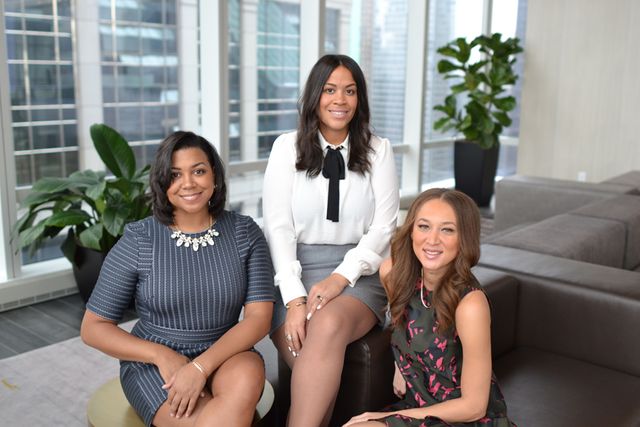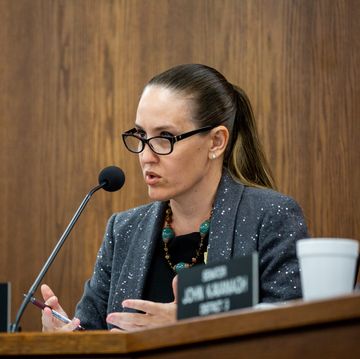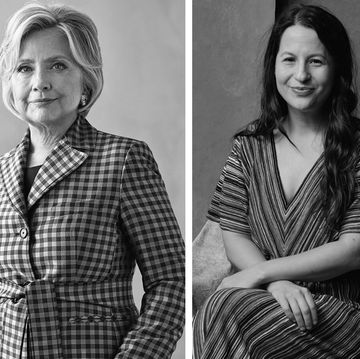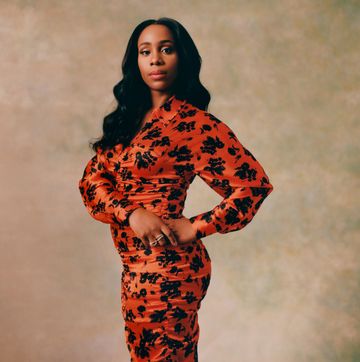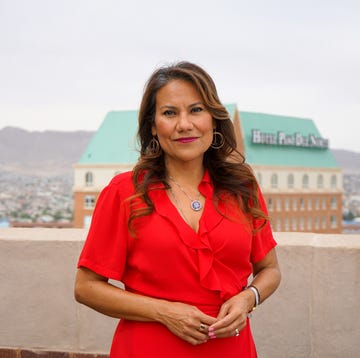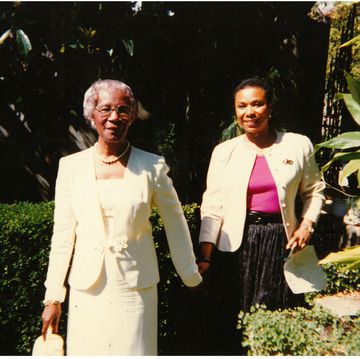Every business has its Hollywood origin story—the wee-hours revelation, the "Eureka!" moment, the so-crazy-it-just-might-work experiment. But the tale that the partners of the African-American- and female-owned KMR Law Group like to tell isn't some blockbuster epic. It's made of about 140 characters and one very consequential tweet.
"I had been doing some work that I definitely didn't love," explains Yondi K. Morris, a founding partner of KMR. "Technically, I was a contract attorney, which means I went into law firms to help them with whatever they needed for some period of time." Newly installed at a law firm that she is too polite to shame, she was on the clock when a partner went over to check in on her progress.
"He just looked at me and said, 'Okay, slave, get back to work.'" She was the only person of color in the room. "I looked around and just waited for someone to catch my eye," she remembers. No one met her gaze. Worse still, no one looked surprised.
"For me, honestly, I wasn't just insulted as an African-American woman. I didn't want to be viewed as a worker bee anymore." She went home and logged on and tweeted, "I need to start my own firm." Keli L. Knight wasted no time. She replied right away, writing, "Let's meet to discuss." They did, and invited Jessica Reddick, an old friend that Morris had known for a decade, to join. "We got together one day in Starbucks and that was the first meeting," Morris says. "We just all clicked—our personalities, our dreams, our ambitions. In that moment, it all made sense." Adrenaline and caffeine flowing, they sketched out a provisional logo on scrap paper and drafted an informal business plan to start a law firm in Chicago. "We decided we were going to do it," Morris says, "and haven't looked back since."
To some extent, they've been planning for this for most of their lives. "From the time that I was a child, I was told that I should be a lawyer," Morris says. "I always had something to say. I was always arguing my point. I would organize family meetings when I wanted something." She remembers strategizing how best to convince her parents to have another child. "I had all my points written out," she says. "It was very thought through!" And while Reddick hadn't exactly planned to go to law school, she, too, remembers "sitting [her] parents down" to explain to them why she should have her way. "I had written out almost a motion to try to convince them what I wanted." Reddick credits her parents—both entrepreneurs—for encouraging her to find a path that could make her happy. It wasn't until she ended up on the business side of a law firm in Washington, D.C., that she realized she wanted to go back to school. "It really did just click," she says. But even when she went to law school, she always was thinking about less traditional ways to explore and practice law. The prospect of a firm that she could help shape was too good to pass up.
And yet, while the move may have seemed obvious to them, it is not the route that most young black women take. Law professor Deborah L. Rhode reported last year that law is one of the least diverse professions in the United States. A full 88 percent of lawyers are white. Only 33 percent of equity partners are women. Put those statistics together and the numbers look even bleaker. Two years ago—mere months after Knight, Morris, and Reddick founded KMR—black women lawyers made up just 2.44 percent of law firm associates in the Chicago area.
Knight, Morris, and Reddick worked on the firm for a full year before they opened for business. They consulted marketing professionals and accountants. They talked to a lot of lawyers. "Admittedly, I was not so much interested in the cautious planning," Knight concedes. "But I'm glad that Yondi and Jessica insisted that we do it. We wanted to put our best foot forward and be taken seriously, because we knew we didn't look like a lot of other law firms out there. We wanted the brand to describe who we were and what we stood for." The process gave them space to decide what they liked best about the practice of law and renounce what they liked least.
"Because we are millennials and use our laptops for everything, we never wanted to require people to be in the office just to be in the office," Morris says. "We take a lot of meetings all over the city, and we like to meet with clients in their spaces so that we can get a sense of the culture of the place. It helps us do our work better. When we meet just us, we meet at each other's houses or we meet over brunch. We didn't want to be chained to our office." All three women decided: They didn't want to hide behind letterhead or email addresses. They wanted to get to know communities of lawyers and other small-business owners. They volunteer in schools, showing kids what an attorney can look like.
"A lot of our interactions do happen via email, though," Morris says. "And because 'Yondi' isn't a name a lot of people know, people don't know if I'm a man or a woman or black or white. They just don't know. So oftentimes, when I walk into a room there's a look of surprise when they see me. I get so many emails addressed to 'Mr. Morris.'"
"We try to have a relatively big bark," she continues. "We have to make our presence known in a room. There are preconceived notions not only about women and African Americans, but also about young people. We're all in our early thirties. We're not traditional attorneys, so sometimes we do have to do a little extra to prove ourselves. We studied hard. We're here for a reason."
And now that they have arrived, the founders have grand plans. A year after they opened for business, they established a legal staffing agency. The subsidiary places attorneys at law firms that need temporary help, and it makes a point to interview and take on minorities and women. Knight adds that the firm has recently hired an associate in Los Angeles, which means at least coast-to-coast expansion is on the horizon. Reddick chimes in: "World domination is next."
"We're learning how to dream big," Morris says. "We could never have planned for what we've already done. We're starting to really feel like the sky is the limit. We're so blessed to have this good fortune. We want to make the most of it."
